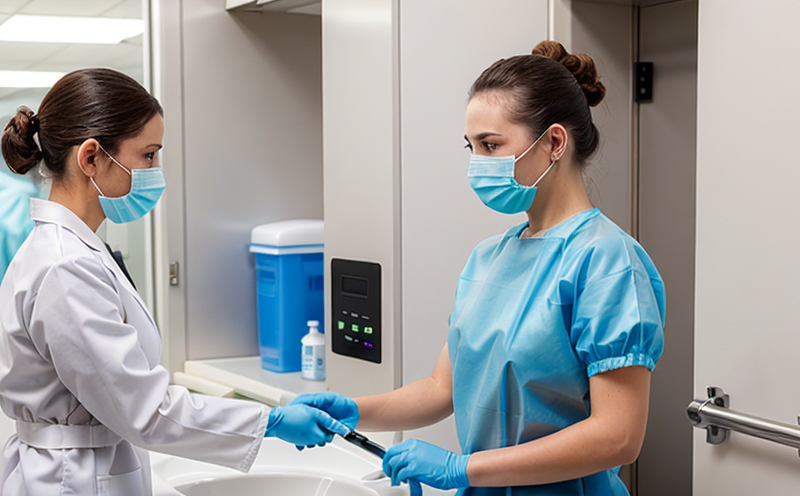BS EN ISO 20743 Antibacterial activity testing of fabrics
The BS EN ISO 20743 standard provides a standardized method for the determination of antibacterial activity in fabrics. This service is crucial for manufacturers, quality managers, and compliance officers who need to ensure their products meet stringent hygiene standards.
Developed by international experts, this test measures how effectively a fabric can inhibit bacterial growth on its surface. The procedure involves exposing the fabric specimen to a specific inoculum of bacteria, incubating it under controlled conditions, and then assessing the reduction in colony-forming units (CFUs) post-exposure.
The testing process is both rigorous and precise, utilizing advanced microbiological techniques that ensure accurate results. It's important for companies in various sectors such as healthcare, hospitality, and consumer goods to comply with this standard. Compliance not only enhances product safety but also builds consumer trust.
For quality managers, this test ensures consistent performance across batches of fabric. For R&D engineers, it provides critical data for innovation in fabric design and antimicrobial treatments. Procurement teams benefit from reliable standards that guarantee the integrity of their supply chain.
The BS EN ISO 20743 method is recognized globally and mandates strict adherence to standardized procedures. This ensures uniformity across different laboratories worldwide, making it easier for manufacturers to export products internationally while maintaining high hygiene standards.
Compliance with this standard also opens up new market opportunities in sectors like medical textiles where hygiene is paramount. By adhering to these stringent norms, companies can differentiate themselves from competitors and meet the growing demand for hygienic products.
In summary, BS EN ISO 20743 antibacterial activity testing ensures that fabrics maintain their antimicrobial properties over time, thus enhancing product performance and safety. This service is essential for any organization serious about maintaining high standards of hygiene in its textile products.
Benefits
The implementation of BS EN ISO 20743 antibacterial activity testing offers numerous advantages to organizations across various sectors. Firstly, it provides a reliable means of ensuring product quality and consistency. By adhering to this standard, manufacturers can rest assured that their fabrics will consistently exhibit effective antibacterial properties.
For R&D teams, the results from these tests provide valuable insights into the performance of different materials under specific conditions. This information is invaluable for refining formulations and improving product design.
In terms of compliance, this testing ensures that products meet stringent international hygiene standards. This not only simplifies regulatory compliance but also enhances brand reputation by demonstrating commitment to high-quality production practices.
From a consumer perspective, knowing that the fabrics they use adhere to rigorous antibacterial testing builds trust and confidence in the product. This can lead to increased customer satisfaction and loyalty, which is crucial for maintaining market share.
The economic benefits of adopting this standard are also significant. It helps businesses avoid costly recalls due to non-compliance with regulations or poor product performance. Additionally, by positioning themselves as leaders in hygiene standards, companies can command premium pricing for their products.
Quality and Reliability Assurance
The BS EN ISO 20743 standard is designed to ensure that the antibacterial properties of fabrics are both reliable and consistent. This is achieved through a series of stringent testing protocols that cover every aspect from specimen preparation to final evaluation.
Firstly, the specimen must be prepared according to precise guidelines provided in the standard. This includes cutting samples to specific dimensions, ensuring uniformity across all specimens, and maintaining controlled environmental conditions during preparation.
The test itself involves exposing the fabric to a standardized bacterial inoculum under defined temperature and humidity levels. After incubation, the reduction in CFUs is measured using microbiological methods such as agar plate counting or spectrophotometric analysis. These methods are chosen for their accuracy and repeatability.
The results of these tests are then documented comprehensively, including details on specimen preparation, testing conditions, and observed outcomes. This documentation forms the basis for quality assurance processes within manufacturing facilities.
Moreover, regular audits by accredited laboratories ensure that all steps in the testing process comply with international standards. This continuous monitoring helps maintain high levels of reliability and consistency across different batches of fabric produced by a manufacturer.
In summary, adherence to BS EN ISO 20743 not only guarantees reliable antibacterial performance but also instills confidence among customers about product quality and safety. It is an essential tool for maintaining industry leadership in hygiene standards.
Use Cases and Application Examples
| Use Case | Description |
|---|---|
| Hospital Gowns & Masks | Ensures that medical textiles effectively inhibit bacterial growth, safeguarding patients and healthcare workers. |
| Care Home Linens | Reduces the risk of infections in residential care settings by providing hygienic bedding materials. |
| Wearable Technology Fabric | Incorporates advanced antibacterial properties into smart clothing for enhanced comfort and hygiene. |
| Sportswear & Workout Gear | Maintains freshness and prevents odors in performance apparel, enhancing user experience. |
| Home Textiles | Provides a hygienic environment at home by ensuring that curtains, carpets, and upholstery fabrics are free from harmful bacteria. |
| PPE for Industrial Use | Safeguards workers in high-risk environments by providing protective clothing with superior antibacterial properties. |
| Travel Accessories | Ensures that textiles used in travel products, such as bags and bedding sets, remain hygienic during prolonged use. |
The BS EN ISO 20743 standard finds extensive application across various industries. From healthcare to consumer goods, the ability of fabrics to inhibit bacterial growth is critical for maintaining hygiene standards. The table above outlines some key use cases where this testing is particularly beneficial.





